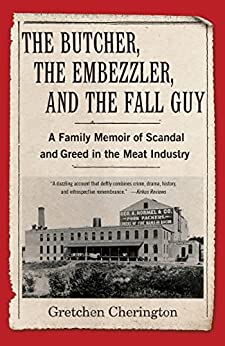THE BUTCHER, THE EMBEZZLER, AND THE FALL GUY: A Family Memoir of Scandal and Greed in the Meat Industry, by Gretchen Cherington (SheWrites Press, 2023), is not only a quick read but also a guide to how to write family memoir.
It is the story of the founding of the Hormel meat company and an intimate glimpse of how the Midwest powered American progress and innovation in the early 20th century; it is also a family memoir. Finally, and this is the reason the book reads in a flash, it is a mystery.
Anyone interested in writing a family memoir would be well advised to follow Cherington’s progress in writing the book, as she allows the reader to do. She shows how important it is to live for a while in the physical place where the tale evolved, how difficult it is to identify and then exclude the author’s personal experiences, memories, and biases, how important details are, how aware the author must be of other family members, and how selective the author must be in choosing what part of a massive bank of facts to present and in what order. She is generous in allowing the reader to follow along as she thinks through her writing strategy.
Cherington’s goal is to determine if her grandfather, Alpha LaRue Eberhart, known as A.L., was a good guy or a bad guy. The setting is Austin, Minnesota, the very definition of small town America, home of the Hormel meat company and the SPAM Museum. George Hormel, the company’s founder, was raised in hard times and was known as a rough person to deal with, but over a hundred years ago, he spied possibilities in Austin because the railroad ran through, and around it was farmland where fine quality livestock were raised. Cherington’s grandfather A.L. was hired by George to pair his flair for sales with George’s ambition.
George preferred to hire from within and nurtured one of his employees, Ransome Josiah Thomson, known as “Cy”, to handle the accounts. Cy later confessed to siphoning off $1.187 million, (the modern equivalent of $18.7 million) through clever and brazen bookkeeping. His jail memoir is one of the personal journals Cherington mines for her story.
After the embezzlement was discovered, A.L. was fired, and Cherington wonders if he was complicit in the crime. Did George Hormel have good reason to fire him or was he looking for a fall guy?
It feels churlish to be picky because the book reads smoothly, is paced robustly, and the descriptions of places and characters are lively and intimate, but I did object to the author’s untrammeled love of metaphors and similes. I’d go along with the frequently encountered advice often given to all writers, not only memoirists, that metaphor should be used sparingly.
By the end of the book, Cherington’s meticulous research has solved the mystery, leading to even more evaluation. Finding an answer can often lead to a new trail of breadcrumbs… Perhaps the final conclusion of this book should be “life is complicated.” Complicated, but very interesting.
A discerning, aspiring family memoirist will realize that simply dredging up personal memories will not suffice. Time-consuming research, facing heart-wrenching facts, realizing that nobody has a grasp of the whole truth, and probably spending a not-insignificant amount of time and money will be required to produce a book as interesting as this one.
